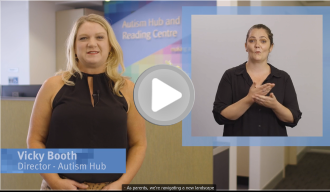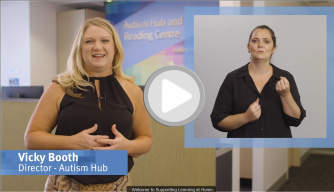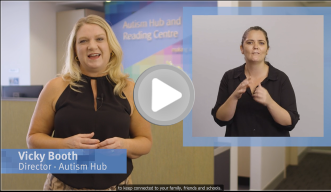Getting started

The Autism Hub and regional autism coaches have created the following resources to support families with students with autism to begin learning@home. We understand that each student with autism is unique and we encourage you to select resources and activities that you know will harness the strengths of your child to support their learning.
Resources will continue to be developed and added to this page.
Transition to learning@home
Supporting learning at home

Below are resources and activities to support you to keep your children with autism motivated and engaged with their learning:
Wellbeing for children with autism

Below are activity ideas to help you support your child’s wellbeing and engagement. These activities are linked to the Australian Curriculum
Personal and Social Capability learning continuum.
For questions or concerns regarding your child’s educational program, please continue to work with and seek support from your child’s classroom teacher and school team.
InclusionED
Supporting diverse learners
inclusionED is an online platform that assists educators to support their students, whether they are at school or learning from home. Parents can also utilise the free tools to support their children to learn from home. inclusionED provides access to practices in the form of:
- how-to guides with steps to successfully implement a practice
- instructional and informative videos
- PDF tip sheets, word templates and handouts
- research reports and journal articles.
inclusionED combines the outputs of more than 25 research and development projects carried out through Autism Cooperative Research Centre's (CRC) School Years Program in more than 300 Australian schools over the past six years. inclusionED has been delivered through a collaboration between Autism CRC and Queensland University of Technology (QUT).
To explore and join inclusionED go to:
https://www.inclusioned.edu.au/
Practices to support students with autism on InclusionED
Use visual schedules to help students stay on task
Visual schedules show students the sequence of activities or events that will happen over a certain amount of time. Students can see where these activities take place and when they will happen. Seeing the activities helps students to understand what they will be doing and reassures them about what will be coming next.
This practice will help students to:
- understand the routine
- work independently
- understand changes.
https://www.inclusioned.edu.au/node/2198
Use instructional sequences in your classroom
By providing an instructional sequence at the beginning of each lesson, teachers give students a road map of what will happen in the lesson. A clear visual instructional sequence helps students understand lesson content, purpose, and objectives—what they are doing and why.
This practice will help students to:
- remember homework
- understand the routine
- know what to expect
- work independently.
https://www.inclusioned.edu.au/node/2279
Structure tasks using work systems
Work systems provide a means for teachers to structure tasks or elements of a task for students on the autism spectrum. By developing appropriate work systems and supporting students to use personalised work systems, students are empowered to become more independent in completing tasks and activities.
This practice will help students to:
- work independently
- be calm
- plan and organise
- pay attention to tasks and activities.
https://www.inclusioned.edu.au/node/2204
Returning to school
Returning to school
Contact
Additional enquiries can be made by contacting the Autism Hub on:
Phone: (07) 3328 6950
Email:
AutismHub@qed.qld.gov.au